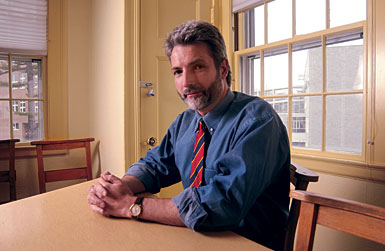Substance abuse: Molding passion into momentum
When Mark McGovern, Ph.D., left his Chicago psychology practice in July 2001 to join the DMS faculty, he was expecting to work with Robert Drake, M.D., Ph.D., director of the New Hampshire-Dartmouth Psychiatric Research Center (see this issue's "Faculty Focus" profile on page 66). McGovern's expertise is in treating patients dually diagnosed with mental illness and substance abuse problems.
But then the chair of psychiatry, Peter Silberfarb, M.D., asked McGovern to attend some meetings at Dartmouth about substance abuse. McGovern, an associate professor of psychiatry, was surprised to find an "incredibly diverse" group of people involved— former U.S. Surgeon General C. Everett Koop, M.D.; Joseph O'Donnell, M.D., senior advising dean at DMS; Jack Turco, M.D., director of the Dartmouth Health Services; other clinicians and researchers; faculty from Native American Studies and the Departments of English and Russian; staff from the library and the chaplaincy; and even some alumni.

|
|
Mark McGovern arrived at Dartmouth two years ago and
shortly found himself heading up a substance-abuse project
that is bringing diverse constituencies together. |
Desire: "They were talking about a desire to do something about substance use at Dartmouth. . . . They were talking about drunks that were showing up at the emergency room and being sent away. They were talking about everything," McGovern recalls. "It was really passionate— but incredibly vague."
Many of the attendees had participated in an interdisciplinary Dartmouth course called "Alcohol, Addiction, and Health," taught by Gail Nelson, Ph.D., a research associate in psychiatry. "Gail in a very creative way brought in multidisciplinary faculty and alums and students who were in recovery to talk about addiction and situated it in the context of literature and culture and art, from film to painting," says McGovern. (See the Summer 2001 issue for more about this course.)
Within months of McGovern's arrival, the group convinced Dartmouth Provost Barry Scherr to fund a Dartmouth Center on Addiction, Recovery, and Education (DCARE) for two years. McGovern was asked to be its executive director and Nelson the associate director.
It quickly became apparent that DCARE's most important role would be as a coordinator. Many people at Dartmouth and in the community were already involved in substance abuse initiatives, but McGovern was surprised that "a lot of them didn't know about one another." Coming from an urban area, he assumed that "in a place like this, everybody knew . . . what everybody else was doing."
DCARE decided to create several task forces to keep its work focused. "Our job at the core would be to keep the ball moving on these task forces," says McGovern. "The task forces turned out to be the heart and soul of the whole thing."
The physician training task force, for instance, determined that DMS "was not doing a bad job" incorporating substance abuse issues into the curriculum, explains Donald West, M.D., the chair of that group. "But there was nowhere to refer patients for treatment."
Talk: "We were talking the talk, but not walking the walk," says O'Donnell, who is cochair of the DCARE planning council with Koop. "If we weren't dealing with the treatment, it would undermine what was being taught in the classroom." McGovern agrees, saying that medical students "had this great course work," but later, during their clinical rotations, "were seeing role models . . . talking about 'Those hopeless people' and 'We don't treat them here.' . . . Not the best role models."
A subcommittee of that task force developed a proposal for an intensive outpatient treatment program at DHMC. The proposal is under review by the administration.
The community task force, cochaired by O'Donnell, is pushing for a residential treatment center for adolescents in the Upper Valley. Now adolescents who need residential treatment have to go as far away as New York or even Arizona. "The further away treatment takes place," McGovern explains, "the more difficult the reentry is and the more likely relapse will take place."
The community task force also facilitates DMS student involvement with abuse issues through smoking cessation clinics, court diversion programs, and the College's fraternities and sororities.
Another task force is conducting an ethnographic study of substance use at Dartmouth, to determine how alcohol and drugs are woven into the fabric of the College's culture.
Forums: DCARE's other activities include coordinating public forums to build awareness about substance abuse issues and meeting with government leaders. The organization has become "a platform to facilitate, to inspire, to encourage all these kinds of activities in all these different fronts," explains McGovern.
Thanks to DCARE, "there's a lot of momentum," concludes O'Donnell.
Laura Stephenson Carter
If you would like to offer any feedback about this article, we would welcome getting your comments at DartMed@Dartmouth.edu.
